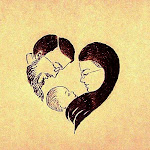Shortly after my last post on Orthopraxy, I found a site that actually wrote on the topic.
Orthodox Info has a reputation for offering a conservative, traditionalist mindset on all things Orthodox - some would go so far as to say too conservative, too traditionalist. Some would find their anti-ecumenical stance schismatic ... I know that while [over the years] I have enjoyed reading some of the articles on Orthodox Info, I have avoided spending too much time there as I worried about becoming extreme in my beliefs or my behaviours, about drifting into the wild and woolly frontiers of the monastery-going, parish-hopping, Bartholomew-bashing, holier-than-thou Superschismatics. I've known a few, and while some are genuinely nice people, many display nothing more than emotional and relational fragility, with all the erratic and irrational actions that that would entail.
All the same, if mainstream North American Orthodoxy does not bother to teach its children how to live the tenets, doctrines, and dogmas that they do teach, one must go to those who will bother. Muhammad must go to the mountain if the mountain will not come to Muhammad. And so I resolved to go digging on Orthodox Info's website for something of what I sought, figuring that if anyone would care about the old-time traditions, those behind this site would.
Ironically, I didn't have to search far at all.
Two clicks, in fact. The sidebar "Living an Orthodox Life" and then the drop-down menu ... and presto! I found praxis. First I read an article by Fr. Seraphim Rose. While that was stirring enough, I opened this article (followed by chapters 1, 2, and 3), entitled A Guide to Orthodox Life, by Fr. David and Presbytera Julianna Cownie, and I have been reading it ever since.
Many of the practices are not new to me, but I am astounded by how much is, and I am deeply appreciative that the Cownies have collated all these practices in one place. I don't know where this journey is taking me, but it is exciting, exhilarating, frightening.
For those who have been reading (or checking) this blog regularly or even semi-regularly, my apologies - I haven't had much time to blog. In my spare time I have read and processed and digested, and read some more.
It is entirely within the realm of possibility that I will be sharing my thoughts and my digestions [there's an image to keep you up at night] at some later interval. But for now it is enough to let you know where the search is taking me.
Hristos voskrese!
- V.
The Tower and the Ruin, by Michael Drout
4 weeks ago



3 comments:
First, I am glad to see that you have found what you have been looking for.
I had a quick skim over the Crownie's discussion of the sign of the Cross. While we Catholics make it somewhat differently, the discussion of the practice and its many uses is pure gold and well worth the read for any Catholic as well.
And of course, when the discussion is focussed on the ancient fathers, I would venture that they are common patrimony and worthy of attention for any Catholic regardless.
+ God's blessing upon your studies. +
(The "plus" sign is about the closest approximation of the sign of the cross that I can find on my keyboard.)
Thank you, Les.
It is my intuition (deeper than feeling) that the process of becoming Orthodox in practice, and not just in theological orthodoxy, will be something that takes a lifetime.
The past couple weeks of reading have shown me quite clearly how desperately I needed a couple years (or even a complete childhood) of catechesis. Had I tried to convert and instantly start living this? I would have burned hot for a time and then fallen away.
Three thoughts:
Living my faith will be infinitely harder than believing it.
Changing how I live will not happen - would not have happened - overnight.
I am grateful to be on this path while I am still young, before my child is born.
- V.
Once upon a time I was involved with a well known multi-level marketing organization that I will not name, who had large numbers of motivational speakers.
One speaker I listened to on tape had a very astute observation from within the context of the business, but which can be transferred here. He said that certain individuals were "intellectuals" in the business. By that he meant packed full of knowledge but still unable to put it into practice. In that sort of business there are specific reasons for that situation that would not apply here, but the idea is one that I never forgot, likely because I was one of those individuals and eventually got out of the business.
And I have found that as a Catholic, knowledge is not practice, and for someone like me, acquiring knowledge is easier than using that knowledge, living that knowledge. Knowledge perhaps is even an inadequate word to encompass what is required and acquired living the faith.
Post a Comment